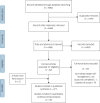Self-management interventions for people with severe mental illness: systematic review and meta-analysis
- PMID: 30898177
- PMCID: PMC6499726
- DOI: 10.1192/bjp.2019.54
Self-management interventions for people with severe mental illness: systematic review and meta-analysis
Abstract
Background: Self-management is intended to empower individuals in their recovery by providing the skills and confidence they need to take active steps in recognising and managing their own health problems. Evidence supports such interventions in a range of long-term physical health conditions, but a recent systematic synthesis is not available for people with severe mental health problems.AimsTo evaluate the effectiveness of self-management interventions for adults with severe mental illness (SMI).
Method: A systematic review of randomised controlled trials was conducted. A meta-analysis of symptomatic, relapse, recovery, functioning and quality of life outcomes was conducted, using RevMan.
Results: A total of 37 trials were included with 5790 participants. From the meta-analysis, self-management interventions conferred benefits in terms of reducing symptoms and length of admission, and improving functioning and quality of life both at the end of treatment and at follow-up. Overall the effect size was small to medium. The evidence for self-management interventions on readmissions was mixed. However, self-management did have a significant effect compared with control on subjective measures of recovery such as hope and empowerment at follow-up, and self-rated recovery and self-efficacy at both time points.
Conclusion: There is evidence that the provision of self-management interventions alongside standard care improves outcomes for people with SMI. Self-management interventions should form part of the standard package of care provided to people with SMI and should be prioritised in guidelines: research on best methods of implementing such interventions in routine practice is needed.Declaration of interestsNone.
Keywords: Schizophrenia; bipolar affective disorders; community mental health teams; psychosocial interventions; psychotic disorders.
Figures
References
-
- Taylor SJ, Pinnock H, Epiphaniou E, Pearce G, Parke HL, Schwappach A, et al. A rapid synthesis of the evidence on interventions supporting self-management for people with long-term conditions: PRISMS – Practical systematic Review of Self-Management Support for long-term conditions. Heal Serv Deliv Res 2014; 2: 1–580. - PubMed
-
- Interdepartmental Serious Mental Illness Coordinating Committee. The Way Forward: Federal Action for a System That Works for All People Living With SMI and SED and Their Families and Caregivers – Full Report Substance Abuse and Mental Health Services Administration (SAMHSA), 2017.
-
- Mueser KT, Corrigan PW, Hilton DW, Tanzman B, Schaub A, Gingerich S, et al. Illness Management and Recovery: a review of the research. Psychiatr Serv 2002; 53: 1272–84. - PubMed
-
- Mueser KT, McGurk SR. Schizophrenia. Lancet 2004; 363: 2063–72. - PubMed



